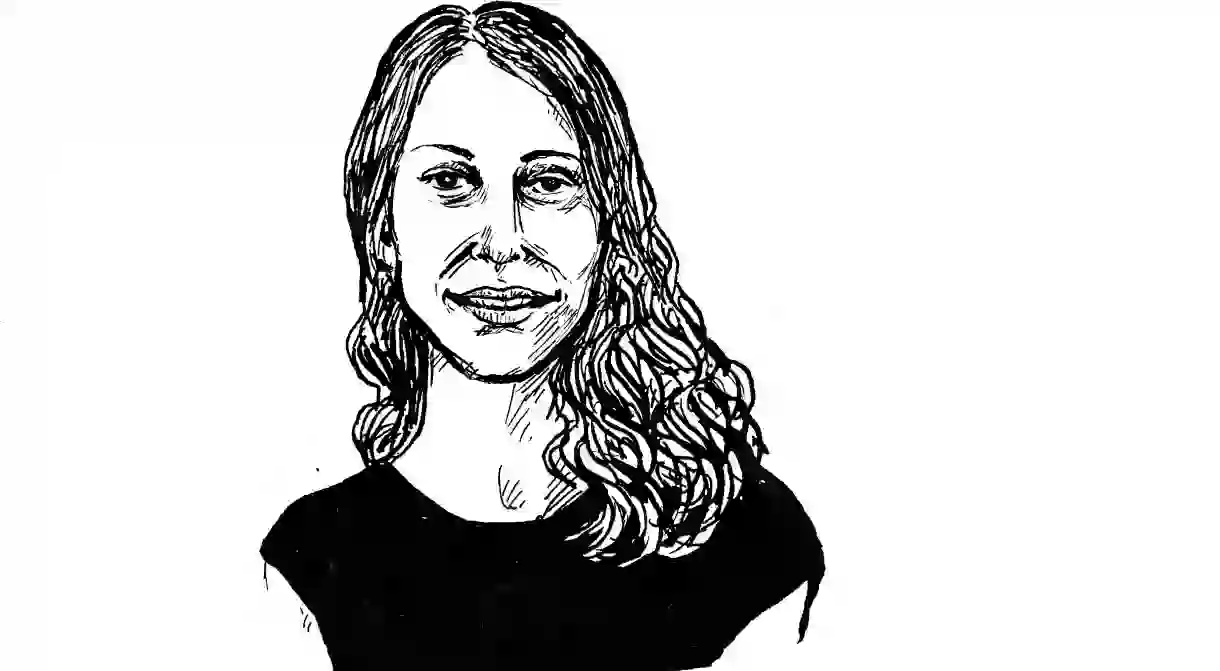20 Translators Under 40: Emma Ramadan

As part of our “20 Literary Translators Under 40” series, we interviewed French language and African francophone literary translator Emma Ramadan.
Recent translations: Ahmed Bouanani’s The Shutters(Morocco), Anne Garréta’s Sphinx (France)
Extracurricular: Co-owner of Riffraff, a bookstore/bar opening later this year in Providence, RI.
Honors: 2016 PEN/Heim Translation Fund Grant for The Shutters
Read: An excerpt of The Shutters by Ahmed Bouanani
What are you currently translating?
Right now I’m translating Virginie Despentes’s Les Jolies choses for Feminist Press. It’s about twin sisters, one of whom is hell-bent on getting famous but has no talent; the other has an amazing voice but is cripplingly anti-social. They both want money. So they team up, but when one of them commits suicide, the other takes her place, takes over her life, and sees what it’s like to be her: a woman always trying to please men because she believes it’s the only way to get ahead. She sees what women put up with to get what they want, how much abuse they’ll take to keep what they’ve gained. How women are constantly told how they are supposed to look and act and the hate incited when they fail to live up to society’s expectations, as well as the hate incited when they play their parts to perfection. I love it.
I’m also in the final stages of Anne Garréta’s Pas un jour (Not One Day) which is forthcoming April 2017 from Deep Vellum. It’s an autobiographical exploration of the women Garréta has loved or who have loved her throughout her life, and the link between desire and memory.
What approach or procedures do you take when translating?
“…and anyhow it’s my translation, i.e. a cross between what he wrote and what I wanted him to say.” –Chris Kraus, I Love Dick
What kinds of works or regions do you gravitate toward?
I spent a year in Morocco on a Fulbright grant to translate and catalog the works of the late author Ahmed Bouanani. I learned a lot from my time there and formed relationships with a number of writers. Since then I’ve been continuing to translate their work, focusing in particular on Bouanani’s poetry.
And then there’s the part of me that really enjoys translating experimental, constraint-based writing. I’ve translated works by two members of the Oulipo: Anne Garréta’s Sphinx, a love story written without gender markers for either of the two lovers, and Frédéric Forte’s 33 Flat Sonnets, sonnets displayed horizontally on the page rather than vertically, with a focus only on rhyme, recreating what a sonnet is or has the potential to be.
Who or what are some untranslated writers or works that you would like to see in English? Why?
More poetry! More women! More poetry by women! More queer writing (in all senses of the word)! And more women writers from the Middle East—Marcia Lynx Qualey has written up lists of Arab women writers she would like to see translated on her blog, Arabic Literature (in English). I hope soon there will be enough work published from the Middle East and Africa that we can finally stop publishing all books from those regions that only serve to proliferate stereotypes. Tilted Axis Press is helping on this front.
On a very specific note, I wish there were more writing in English by the Swiss writer Charles-Ferdinand Ramuz, who is none of the things I mention above but who I think is doing some of the most interesting things with language I’ve ever seen.
What are some of the more interesting literary developments happening in the language or region you translate from?
In Morocco, poetry written in Darija (the Moroccan dialect of Arabic) has become increasingly popular in the last two decades. Darija is a spoken language, and literature is typically written in Modern Standard Arabic or French. For those unable to read either of those languages, this poetry, called zajal, makes literature accessible.
Similarly, in French-language books, you can see a lot of verlan, which is a spoken slang that originated decades ago in the suburbs of France among working-class immigrants but that has now been adopted by bougie Parisian teens and even included in some French dictionaries. Verlan is the inversion of syllables or sounds in a given word; for example the word femme (woman) becomes meuf, and choper (to nab or to catch) becomes pécho. Virginie Despentes sprinkles verlan quite a bit into Les Jolies choses—it makes the dialogue more realistic, and it’s been fun to suss out what on earth a keuf is.
What is a recent translation challenge you faced?
I’m usually very adamant about maintaining rhyme scheme across languages—if an author chose to write rhyming poetry, I think it’s extremely important to honor that, keeping the same rhythm and spirit in English. However, I hit a wall translating a handful of the poems in Ahmed Bouanani’s poetry book The Shutters. Some of the poems had an ABAB rhyme scheme that certainly played into the experience of reading them, but they were about extremely personal memories, shattered childhoods, violent acts. Despite the constraint of a rhyme scheme, every word felt so purposeful and powerful, and I felt it was more important to sacrifice the rhyme than to sacrifice the specific word choices he made.
On a far less serious note, in the book I’m translating by Virginie Despentes, there’s a punny porno title, J’ai de la chatte, which means something very straightforwardly lewd but is also an idiomatic expression meaning “I’m lucky.” Now taking suggestions.













